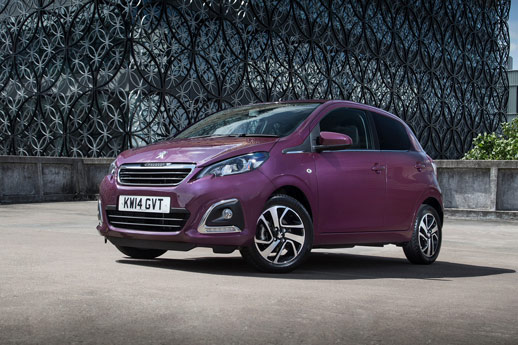Top 20 greenest car brands in Europe

UK roads are becoming greener and greener thanks to the boom in interest towards electric and hybrid vehicles.
In 2015, plug-in hybrids experienced a phenomenal growth, with sales more than doubling, and pure electric vehicles also saw a huge boost with an uplift of around 50%.
Autoebid can save you thousands with new car discounts, simply input your specification, delivery timing and finance requirements, then sit back whilst our dealers compete to win your order. Enjoy new special offers by visiting AutoeBid.com today.
With a significant number of green vehicles making up a growing part of the UK car market, JATO Dynamics have carried out research in order to find out which is the greenest. Based on volume, the following 20 brands have been listed as the most environmental friendly in Europe.
20: Mercedes-Benz - 128.2g/km CO2
Mercedes-Benz's average brand CO2 emissions of 128.2g/km is an improvement of its 133.5g/km figure from 2014. Its place in the rankings is reflective of its range of vehicles which include several SUVs and AMG-badged performance cars.
BMW's average CO2 emissions of 128.0g/km from 2014 remained the same 12 months on. However, with demand expected to be high for the all-new BMW 330e plug-in hybrid, which offers a staggering 44g/km, it's likely BMW will move up the emissions league table next year.
The Korean carmaker has fallen one place in the rankings with its average CO2 emissions of 127.7g/km. Kia should expect a better performance in 2016 with the Kia Optima plug-in hybrid and all-new Niro hybrid offering lower CO2 emissions.
Hyundai's average CO2 emissions of 127.5g/km means it drops from 15th to 17th in the 2016 table, but slightly better than it's South Korean rival Kia.
Mazda are not known for making either hybrid or electric cars, even diesel are lacking with this manufacturer, however their average CO2 emissions of 127.4g/km keeps them above a number of rivals.
Audi have enjoyed a rise in the table for best emission figures despite not offering a city car. However, thanks to the sales of its A1 supermini, Audi have moved from 18th in 2014 to 15th in 2016.
With 126.3g/km, Vaxhaull's average emission has enjoyed a 3.9g/km fall in 2015, allowing the manufacturer to move up the table.
Volvo's position in the table hasn't changed as it continues to change the look of its entire range of vehicles. We will see the introduction of the S90 and V90 later in 2016, which has already saw the launch of the XC90.
12: Dacia - 121.9g/km CO2
Twelfth in the table isn't bad for Dacia, who don't offer any low-emission vehicles in its range despite its figures of 121.9g/km CO2.
This is one table that Ford do not come out on top of. The UK's leading carmaker has average CO2 emissions of 118.1g/km, meaning it just misses out on a top ten finish, as well a slipping from 9th to 11th.
10: Volkswagen - 117.8g/km CO2
It's hardly surprising that Volkswagen are not the greenest of carmakers in the world following the emission scandal. However, a top ten position off the back of the negative publicity means that VW is actually one of the most improved brands of the year.
Fiat recorded an increase in CO2 emissions, suffering a small rise of 0.3g/km making for a 117.8g/km average. This could be reflective of the introduction of the Fiat 500X.
MINI's position of 8th in the table is a huge achievement for the brand considering its lack of sales meant that the brand didn't even feature in 2014's top 20 list.
This may be the highest SEAT feature in the table for greenest car brands what with the launch of its first SUV in 2016. The SUV sector is one of the worst performing segments in Europe, which is sure to increase SEAT's average emission figure of 116.8g/km.
It seems there's nothing Skoda can do wrong at the moment, with the latest achievement being the most improved brand in the top 20, reducing its average CO2 emissions by 6.2g/km. This can be largely thanked by the introduction of its supermini, the Skoda Fabia.
Nissan have recorded the highest average increase in CO2 emissions among the top 20, but still remain in fifth position. The Japanese brand recorded a rise in the average emissions for its top-selling Qashqai, from 115g/km to 116.3g/km.
Despite finishing just outside the top three, Toyota can be proud that they managed to reduce its average emissions by 4.9% to 107.7g/km in 2015. An impressive 29% of its registrations were accounted for by hybrid vehicles, and the all-new Prius, Mirai and C-HR crossover should improve these figures even further in the year ahead.
The French car-making giant will be disappointed to have dropped from top of the class in 2014 to third place a year later. This comes following the sales success of the Captur and Kadjar.
Rising from third to second place, the Citroen's 5.1g/km drop in CO2 emissions driven by the C4 Cactus makes the manufacturer runner-up in the top 20 greenest car brands in Europe.
Finished ahead of its rivals, the French car-maker Peugeot comes out top of the pile when it comes to reducing emissions. Peugeot enjoyed a large number of sales of the 108 city car and the remarkable 97.8g/km CO2 emissions offered across the 308 range, as well as the top-selling 208 which is below the 100g/km mark.
